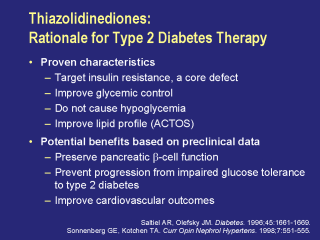| front |1 |2 |3 |4 |5 |6 |7 |8 |9 |10 |11 |12 |13 |14 |15 |16 |17 |18 |19 |20 |21 |22 |23 |24 |25 |26 |27 |28 |29 |30 |31 |32 |33 |34 |35 |36 |37 |38 |39 |40 |41 |42 |43 |44 |45 |46 |47 |48 |49 |review |
 |
The thiazolidinediones offer a rational
approach to the management of type 2 diabetes. They are known to target
insulin resistance, a primary defect in this condition, and to improve
glycemic control without causing hypoglycemia. ACTOS has demonstrated improvement in lipid profiles in patients with diabetes who are treated with these agents. Potential benefits of thiazolidinedione treatment, which have been suggested in preclinical studies, include further improvements in the cardiovascular risk profile (endothelial cell function, smooth muscle reactivity and effects on the fibrinolytic pathway) and preservation of pancreatic beta-cell function. This latter effect has prompted the use of thiazolidinediones in several studies of the prevention of progression of impaired glucose tolerance to type 2 diabetes. Saltiel AR, Olefsky JM. Diabetes. 1996;45:1661-1669. Sonnenberg GE, Kotchen TA. Curr Opin Nephrol Hypertens. 1998;7:551-555. |